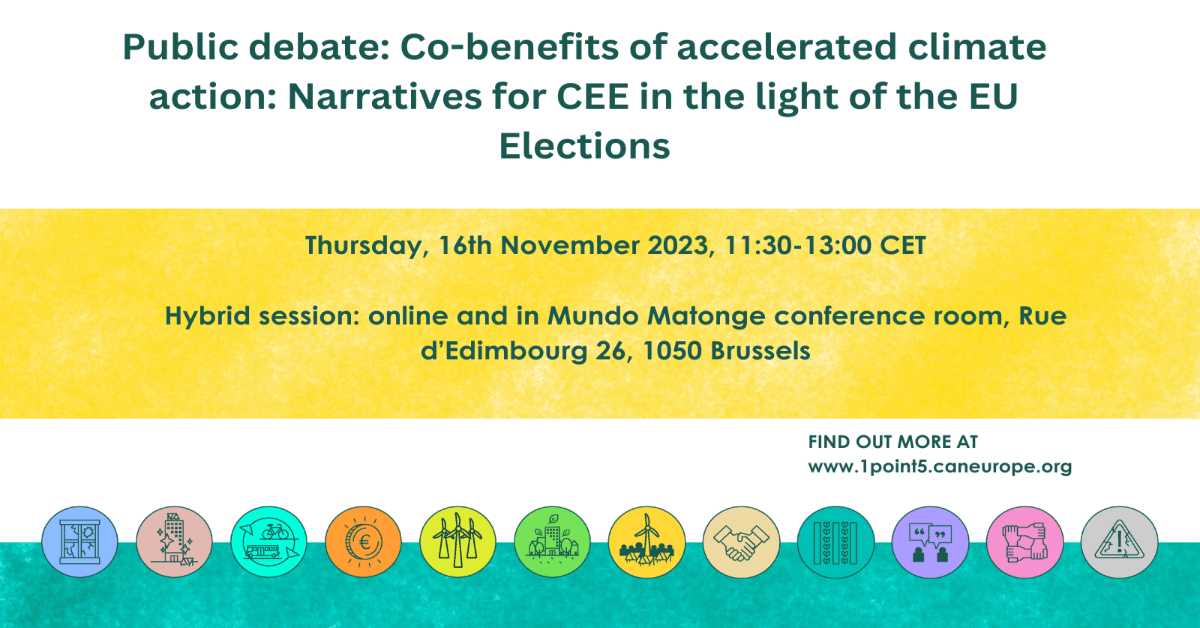Thursday, 16th November 2023, 11:30-13:00 CET
Hybrid session: online and in Mundo Matonge conference room, Rue d’Edimbourg 26, 1050 Brussels
register here
Download the event invite
SPEAKERS:
- Olivier Vardakoulias, CAN Europe: Setting the scene – the launch presentation of CAN Europe’s new report on the co-benefits of ambitious climate action
- Martin Hojsik, Member of the European Parliament, Renew Europe, Slovakia
- Gabriela Měsícová, Public Affairs Project Manager, Change for the Better, Czechia
- Denis Haveaux, Senior Director and EU Representative, Habitat for Humanity International
- Zofia Wetmańska, Co-founder Reform Institute, Taxonomy Manager, Climate Bonds Initiative, Poland
Facilitation: Sylwia Andralojc-Bodych, Germanwatch
Half a year ahead of the European Parliament election we are facing the European Green Deal and the need to increase climate ambition and action coming increasingly under criticism. This criticism is not coming only by right wing politicians, but also some political forces and other actors – especially in Central Eastern Europe – that raise concerns about the costs and social aspects of Fit for 55 and REPowerEU packages’ implementation at national levels.
The need for decisive and bold climate action is valid first and foremost for the EU and its national governments, including the CEE region, which is vulnerable to economic and environmental impacts of climate change and is also to a great extent dependent on fossil fuels. The effect of worsening air quality, pollution, frequency and intensity of heat waves and anomalous disease outbreaks is already consistently affecting human health. But swiftly acting on climate will not only save lives and health costs. In the long term, accelerating and scaling up climate action will be economically beneficial for all EU countries. CAN Europe’s new report will quantify these benefits and give a basis for the discussion, based on scientific evidence about the costs and benefits of climate change action (or inaction).
The outcome of the upcoming European Parliament election will have a major impact on the future of climate action in Europe. However, the election will take place at the national level, so it is important to develop specific national and regional narratives and arguments that address the concerns of voters in CEE, in particular the costs and benefits related to climate action.
After the presentation of the CAN Europe Report on co-benefits of the climate action the event will provide a space for the discussion with key policy makers and experts on the results. A roundtable discussion will highlight the political aspects of the debate and we discuss together how to address the main obstacles to action and the possible gains from accelerated energy transition, especially in the CEE region:
- What are the potential co-benefits of climate action and how can we best harness them in the world of competing interests and narratives?
- How to counterbalance the narrative of climate action being “too costly” and CEE countries not being able to afford rapid energy transition? How to address concerns raising around costs of living and esp. energy crisis?
- How to use the European Parliament election as a communication moment nationally in CEE to show that enhancing climate action is also benefiting the societies and citizens socially and economically? What could be concrete social justice demands that would deliver on climate, too?
- How to build alliances that would enable to create comprehensive responses in this context?
PREVIOUS
NEXT

